Quality is often in the eyes of the beholder, so when we want to make quality content, whose eyes do we need to impress? For content marketers and SEOs, the answer is our audience and Google. We learn what our audience believes by interacting with them, but with Google, we’re lucky enough to have them tell us directly: they evaluate quality through the acronym of E-E-A-T or Expertise, Experience, Authoritativeness, and Trustworthiness.
Google evaluates these criteria through a team of Quality Raters (QRs) who spot-check the search algorithm’s accuracy by manually performing the same Google searches that regular people are doing every day.
QRs are given a list of searches to perform, such as “should I buy an iPhone?” and they’re instructed to double-check the quality of the websites that are ranked highly for those searches against Google’s Search Quality Evaluator Guidelines, including how well they adhere to the principles of E-E-A-T. The results are fed back into the algorithm, so it does a better job of ranking high-quality search results.
The principles of E-E-A-T give you a steady guide for content you create--and existing content that you'll update for quality.
What Is E-E-A-T?
E-E-A-T is made up of four principles that Google uses to assess whether a piece of content is high-quality. Those three principles are:
- Expertise: The author of the content should be an expert on the topic. What “expertise” means differs based on the content. If the article is giving medical advice, then expertise might be a degree in medicine, but if you’re reviewing the newest Adidas cleats, then direct life experience is sufficient.
- Experience: Site managers usually think of experience in the UX (user experience) sense. While page experience does play a role in rankings through Core Web Vitals, this focus on experience is based on the author. The second E of E-E-A-T looks for signals of whether the content's writer actually used the product they are describing. Keep those unique screen shots and examples coming.
- Authoritativeness: The author, web page, and website should have a good reputation as authorities in this industry or field. Authoritativeness could mean that the author or publication has won awards or is well known in their industry or that this particular page has received backlinks from other authorities in this sphere.
- Trustworthiness: There should be proof that we can trust the author, web page, and website to give us accurate and helpful content. Quality Raters examine trustworthiness by looking at the website as a whole, focusing on finding privacy policies, editorial policies, and security updates. They also look at the actual content. Are there citations to back up claims? Are there any obvious factual errors? Does the web page have spelling errors, misleading titles, or any other visual cues that might make people doubt the trustworthiness of the content? All of this contributes to how trustworthy QRs feel a website is.
Why Trustworthiness Sits at the Heart of E-E-A-T
Among the four pillars of E-E-A-T, trustworthiness stands out as the foundation. Google’s ultimate goal is to protect its users from inaccurate, misleading, or even potentially harmful information. Think of the stakes when someone searches for advice on treating a medical condition or making a big financial decision. These “Your Money or Your Life” (YMYL) topics call for deeper scrutiny; Google needs extra assurance that the web pages it ranks can be relied upon.
If Quality Raters encounter patterns of dubious claims, these pages are less likely to be rewarded in the rankings.
Remember that QRs do not directly impact search engine rankings. Instead, their notes on E-E-A-T for each website they check are used to help train Google’s algorithm so that it prioritizes web pages that exemplify these principles. The exact metrics search algorithms use to determine E-E-A-T are not known, but we do know that Google’s algorithms “focus on measurable signals that correlate with how users and other websites value the expertise, trustworthiness, or authoritativeness of a webpage on the topics it covers.”
Instead of worrying about maximizing E-E-A-T signals, the best advice Google gives is to just create content that demonstrates these qualities to the best of your abilities. If people read your content and feel that it has expertise, authoritativeness, and trustworthiness, then, according to Google, it should “ help align it conceptually with the different signals that [their] automated systems use to rank content.”
E-E-A-T and “Your Money or Your Life” (YMYL) Content
Quality Raters' approaches to pages might differ, depending on what your content is addressing. For blog posts on your favorite way of making mac and cheese, Google is going to be fairly lenient when it comes to E-E-A-T. But, for content that can have serious repercussions in your life--YMYL topics we mentioned in the previous section--Google needs to see demonstrable proof of your expertise, experience, authority, and trustworthiness before it ranks your content highly.
We know Google is judging YMYL pages more stringently. When E-A-T (one E at the time) first landed in the spotlight by the Medic Update, SEO expert Marie Haynes noticed that YMYL sites were hit harder than others. In a blog post, Marie published screenshots of YMYL websites that had seen large drops in traffic due to the Medic Update.

Even if your website's topics traditionally fall outside of those categories, these principles still apply. Google holds these standards on website that they crawl, including fashion blogs, gossip websites, forums, and satire websites.
If you’re not sure what kind of website Google categorizes as YMYL, Google gives us a helpful definition. YMYL websites are “[websites that] could potentially impact a person’s future happiness, health, financial stability, or safety .” Google also gives specific examples of these kinds of sites in section 2.3 of their Search Quality Evaluator Guidelines.
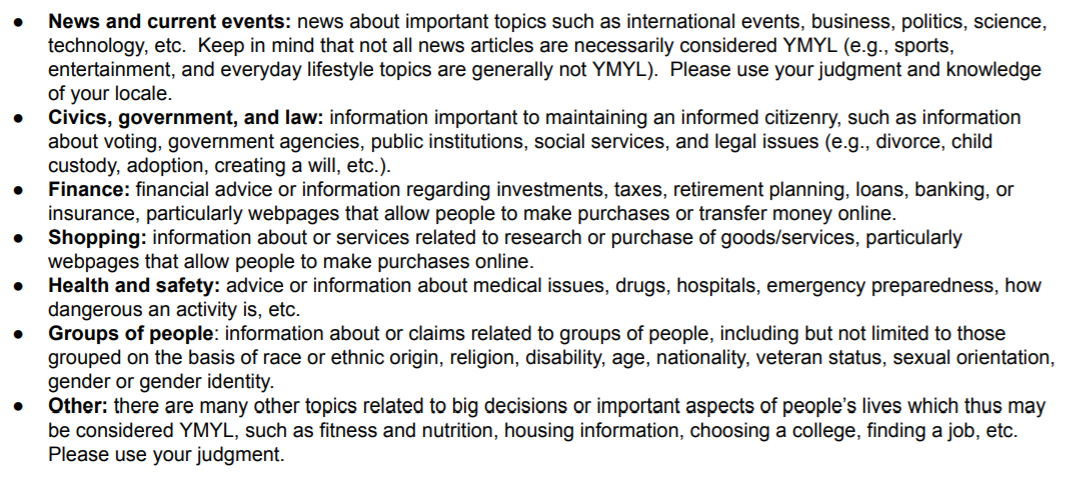
If your page does fall into a YMYL topic, you need to pay closer attention to what you’re publishing. Make sure all the claims you make are accurate and properly cited. Include links that show background details and more information. You’ll also want to take steps to green light authors who can prove expertise in their area.
Qualities of High E-E-A-T Pages
One of the best things about Google’s Search Quality Evaluator Guidelines is that they give specific examples of websites with high E-E-A-T. We can use those examples to reverse-engineer what concrete qualities Google believes these websites have. We boil high quality rankings down to websites that are good in three main areas: reputation, user experience, and self-reference.
High Reputation
Your reputation online does matter. Google tells us this when, in its guidelines, it specifically cites this article from the Wall Street Journal as having high E-E-A-T. Why? The authors are well known, the content is clearly in-depth, and the newspaper itself has won 37 Pulitzer Prizes.
Google also lists this article from Snopes as having a high score. Despite the fact that Snopes isn’t a newspaper, Google says it still rates high because “[u]sers can trust the information on this page due to the website's positive reputation and high level of expertise in debunking stories of this type.”
Good User Experience
This page from the wedding site, The Knot, isn’t a traditional piece of content, but Google's quality team still gives it the thumbs up because it offers an impressive user experience not often seen on other websites. As Google notes, the Knot has “an abundance of pictures, plus options to view by price range, style, etc.” All of this helps readers see that this content is of higher quality than most other websites.
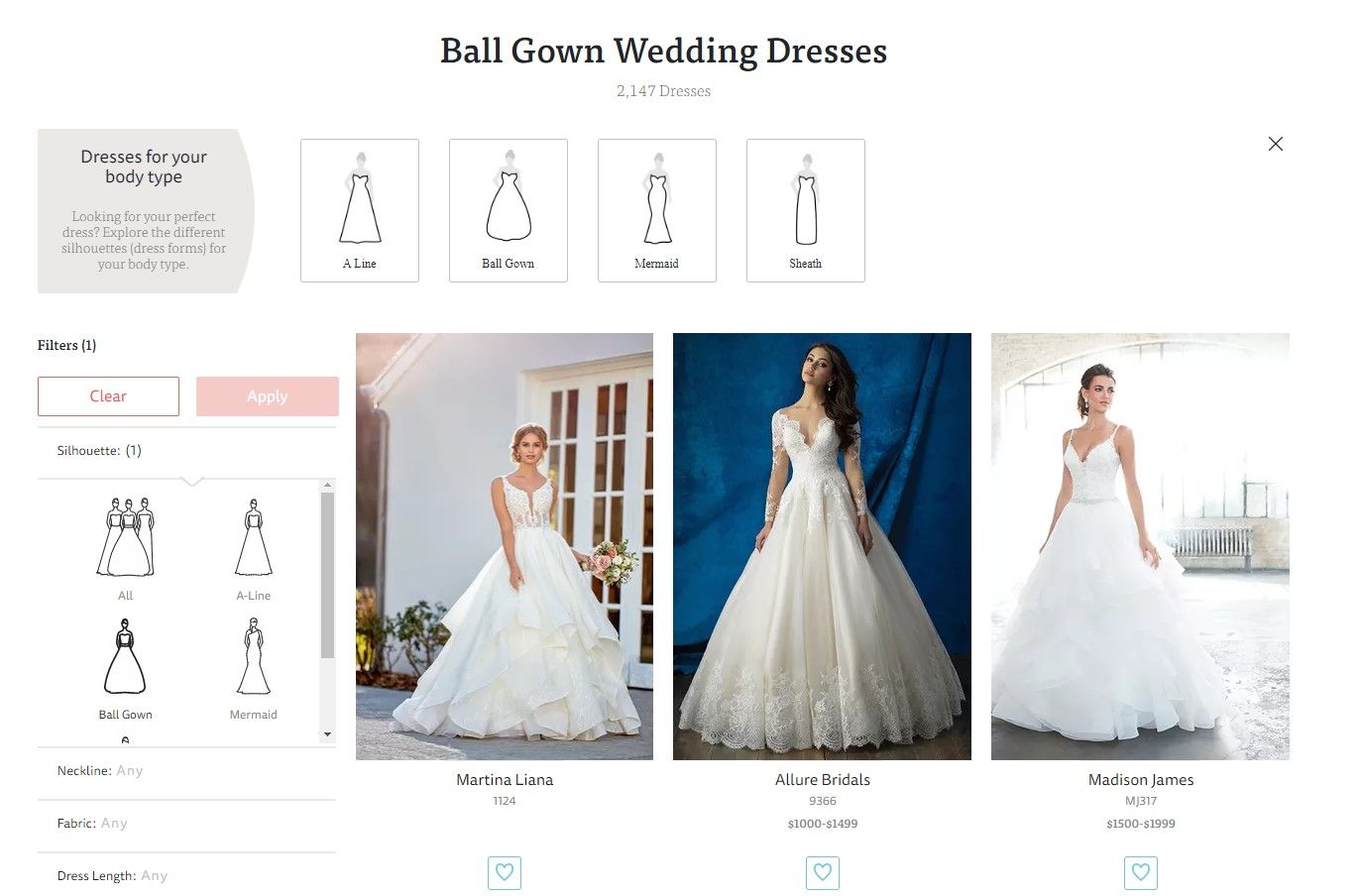
This page, from Target’s website, also has high E-E-A-T because “This is a well-known, reputable merchant, with detailed Customer Service information on the site.” Both of these websites go above and beyond to offer high-quality customer experiences that other websites don’t offer. Not only does this impact the overall experience of searchers, but it also helps prove to readers that the content is more aligned with E-E-A-T principles.

Self-Reference
So far, all of these examples are from more established businesses with polished websites. But Google also gives examples of high quality ratings from smaller sites with less impressive designs.
Harbor Fish & Chips is a restaurant with one location in California and a website that isn’t modern or flashy. Despite that, Google says its website has high E-E-A-T because it “provides information on when the restaurant opened and what visitors can expect. Other pages on the website provide information about the restaurant, including the address, menu, other contact information, etc. This website is highly authoritative because it is about itself.”

"This website is highly authoritative because it is about itself.”
That part is something businesses can excel at. We know ourselves so well that it's possible we take this knowledge for granted. Tell your business stories and share them clearly on your site. Make information widely available, even if you feel your customers will assume it.
For example, coffee shops are understood to be a great workspace. I was traveling to another town and looked for a spot to spend a few hours working. I found a spot with high-rated breakfast burritos and plenty of coffee options, but there were no photos of the interior or mentions of available WiFi. The owners probably consider those to be unnecessary details. To a potential customer, that information would have gone far in giving a better sense of what to expect about the business.
Expertise – The café offers a wide menu and describes its food and ambience well.
Experience – Photos prove they are familiar with the setting and can help me understand it before I arrive.
Authority – Explains show a latte is different from a cappuccino. Gives an overview of the different tea options they offer and whether they're better hot or iced.
Trustworthiness – Shares accurate business hours, gives a recent update on their open mic night (instead of one post about it from 3 years ago).
The important takeaway here is that E-E-A-T is highly subjective to the goal of the content. Everyone can have a high E-E-A-T by providing a great user experience, providing well-researched, quality content, and making sure your website is clear about who you are and why your expertise is authoritative.
Harnessing User-Generated Content for E-E-A-T
Another valuable way to boost your E-E-A-T is by encouraging and showcasing user-generated content. When real customers share their stories, opinions, photos, or questions on your site, it can serve as genuine proof that your business has a positive reputation and authentic experience to offer.
User-generated content (UGC)—think reviews, testimonials, customer photos, or even Q&A sections—signals to visitors and to Google that people are actively interacting with your product or service. This feedback not only builds trust, but it also allows future customers to learn from the collective wisdom and experiences of others. For example, detailed restaurant reviews, photos from actual diners, or answers to common questions show that you have an engaged community, and that your business stands up to public scrutiny.
A few simple ways to encourage more UGC include:
- Inviting customers to leave reviews after a purchase or visit
- Making it easy for users to upload photos or share their experiences on your site
- Prompting visitors to answer questions or offer tips for others
- Hosting promotions or contests that encourage sharing stories or feedback
The result? Your site feels more transparent and trustworthy, which strengthens both your perceived expertise and your reputation—two key ingredients to high E-E-A-T.
Qualities of Low E-E-A-T Pages
Low E-E-A-T isn’t always easy to pick out. Some of the examples Google provides look great, but these websites fail to live up to the shared standards in other ways. Looking through Google’s examples, we found the majority showed signs of being unprofessional, lacking expertise, and allowing rampant inaccuracy.
Unprofessional
This article from a publication called Headlines & Global News is cited for low scores because the writing is unprofessional and has grammatical errors. It also seems to be paraphrased from a different website but with the wrong facts and figures. None of this inspires confidence in the quality of the writing or the information being posted there, all of which hurts its rankings and their E-E-A-T level.

For similar reasons, Google says this article has low E-A-T because it’s full of typos and is inaccurate and meaningless. When writers can’t bother to do the bare minimum as far as fact-checking and spelling, there’s little chance Google will want to present its users with this content on the SERP.
No Expertise
Google wants to see that your page demonstrates actual expertise on the subject you’re writing about, and when that doesn't happen, pages get labeled as low E-E-A-T. For example, here’s a YMYL article about financial advice that rates low. Google's guidelines tell us that there is no evidence that the authors have any expertise in this area.
Remember, this is potentially more harmful than an inaccurate article on household hacks. If you can't get your oven door clean with a lemon and salt the way that they tell you, you try something else. You're out a few minutes and a lemon. Google recognizes that the consequences are more dire when people try unfactual tips about their money or, like in this next example, their health.
Another example of a lack of expertise in YMYL comes from another article about the flu, but the author has no signs of medical expertise. Sure, it’s possible that she is a doctor, but there’s no obvious evidence of that. It only benefits her to demonstrate that kind of credibility, so we assume she can't. As a result, the whole piece is considered to have low E-E-A-T.
Demonstrably Inaccurate
Another article (since deleted) from a news organization claimed that Miley Cyrus was dead. This is low E-E-A-T because--as of the time of publishing--it was obviously untrue. She continues to put out music and make public appearances. Other credible sources have not reported on something that would be a significant story considering Cyrus's public persona. Also, there’s no given author, no cited sources, and there’s very little information about the news organization that published the content.

Similarly, Google listed an article that claims that President Obama banned the Pledge of Allegiance as having low E-E-A-T. In this article, there are no external citations, meaning there’s no way to verify what is said is true. Furthermore, the website as a whole is trying to pass itself off as ABC News when it obviously isn’t. These untrustworthy practices all send the wrong signals to Google and should be avoided in your own writing.
How to Improve E-E-A-T on Your Website
Improving E-E-A-T isn’t a one-and-done fix. It takes a number of steps aimed at increasing the quality of what you publish and your website as a whole. The steps we’ve included here are all about doing what you can to make your website as valuable to searchers as possible.
1. Optimize Your About and Author Pages
About and Author pages are incredibly important for E-E-A-T because they help readers and Google understand what your expertise and authority are on this subject.
These pages should explain why your company or website is an expert and authority in your industry and why the authors writing content are experts. Make sure you list any industry awards and accolades that you’ve won. You’ll also want to link to relevant social media channels for both your company and the authors who write for you.
Here’s an example of a good author page from the popular sports website, The Athletic:
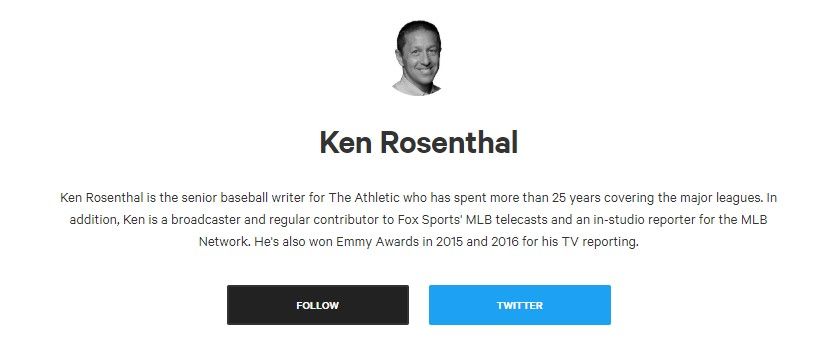
This page explains why Ken is an expert, the awards he has won, and links to his Twitter. It’s simple, but that’s all it takes to make your author pages demonstrate your expertise and authority in this subject.
Credit Your Content Creators
Giving proper credit to the people who create your content is part of building trust with your readers. Always name the writer and any contributors on each blog post, and link those names to unique bio pages. These author pages usually link to their other work, and make their experience and expertise apparent—not just to your audience, but also to Google.
I like the idea of inviting team members to contribute to your content. Even if they aren't comfortable creating content, have them share their ideas on video. Your writers can capture the key points and make it audience-friendly. And that video keeps giving. You can break it into social-media-sized snippets or expand on just one idea in a separate stand-alone piece.
Another idea--consider bringing in outside experts who are willing to share their insights on your page. This not only enriches your content but also helps demonstrate a broader base of authority.
2. Consider Your Authors and Do SME Interviews
With expertise and authority being two driving factors, it’s safe to assume that you should take the authors of your content seriously. If your interns are writing all the blog content, Google likely won’t view them as experts. The experts in your company are the people on your leadership team or people who have worked in the industry for some time.
Now Google of course isn't showing up to watch who is typing up these pieces. Beyond author name, they are looking for more substance in the articles with quotes and examples that offer more insight from an expert's point of view.
If you’re having a hard time getting those people to write blog content for you, consider doing an interview. Try creating content based on subject matter expert (SME) interviews, either with your team's experts or looking further afield and speaking with important figures in your industry.
For example, we spoke with SpyFu founder Mike Roberts to get his thoughts on creating a competitive analysis template.
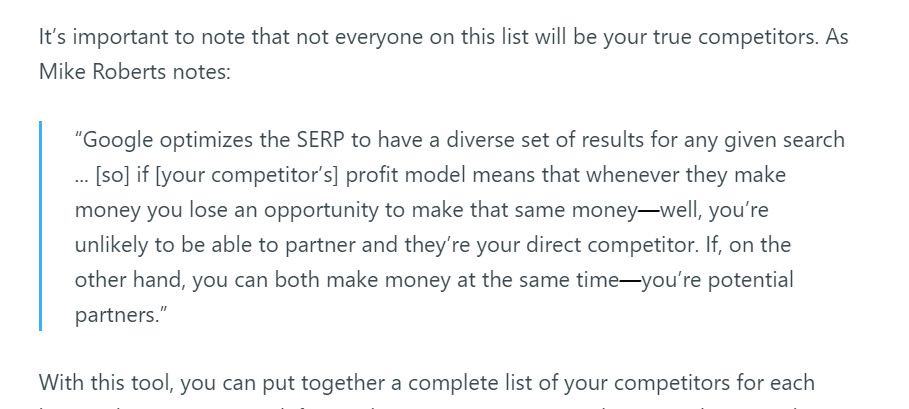
Mike’s expertise boosted the credibility and page quality of the article, helping us better satisfy E-E-A-T and getting us on the first page of the SERP.
More recently, we created a video and social content from a sit-down with our in-house Google Ads expert, Tree Fine. He spoke about using AI to create scripts that help him optimize our Google Ads campaigns and make them more efficient. As the person behind those campaigns, his expertise is clear.
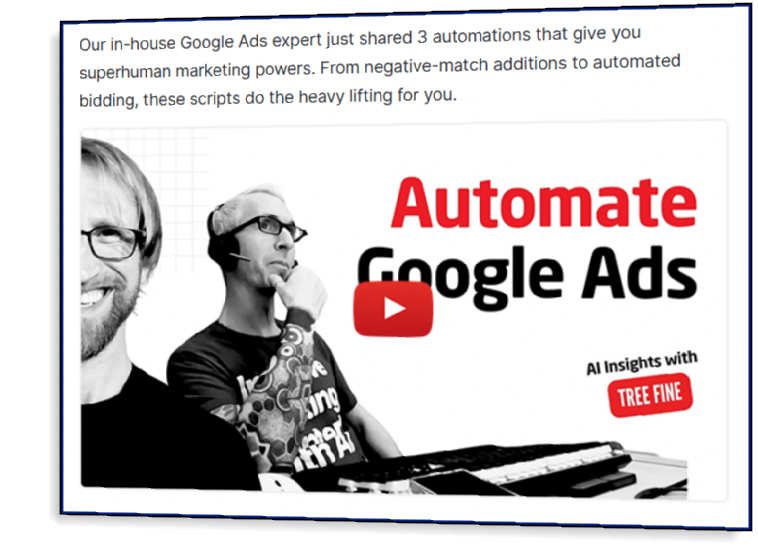
3. Remove Low E-E-A-T Content
A few low-quality pieces of content can drag your whole website down. If your company has been writing and publishing content for years, there’s a good chance that a few pieces of thin content have gotten published and are hurting your SEO. More isn’t always better. Take some time to find your low-quality pages and either:
- Remove them: It’s never a great feeling to get rid of something you worked hard on, but if it has no redeeming qualities, get rid of it.
- Refresh them: Articles get old, and some that were good at the time are no longer up-to-date; for these, just give them a content refresh by adding new examples, updating the information, and adding whole new sections to see if you can get them ranking again.
- Repurpose them: Some content just doesn’t stand on its own. For these, see if you can add them to other pages to make those pages more comprehensive; you might just help them rank better in the process.
If you aren’t certain if your content is still worth keeping, take a look at the search metrics and search intent of your target keyword. If that keyword is getting good volume and the ranking pages are similar to your own, consider taking another swing at ranking. If not, it might be better to just cut your losses and focus your time elsewhere.
4. Become a Known Authority in Your Sphere
Establishing a reputation doesn't happen overnight, but that doesn't mean you shouldn't start developing your authority as an expert in your field right now. Take concrete steps to build up your name and your business's name by becoming a thought leader that others follow to stay informed.
To build your reputation and your website’s, consider:
- Writing thought-leadership pieces on your blog
- Weighing in on industry conversations on social media
- Starting an industry newsletter or commissioning original research
The end goal is to have people thinking about you and your business whenever they need questions answered about your field. As a bonus, as you and your website become more known, you’ll grow your quality backlink profile as people cite your publications as evidence for their own claims. Backlinks from other industry players are another way of demonstrating your authority in your field.
5. Increase Positive Reviews
Positive reviews on third-party websites signal to readers and Google that you’re a trusted authority in your industry. For example, if you’re looking for a plumber in your area, you’ll definitely check reviews of their business before you hire them. Consistent good reviews can help you trust your home and money to this contractor.
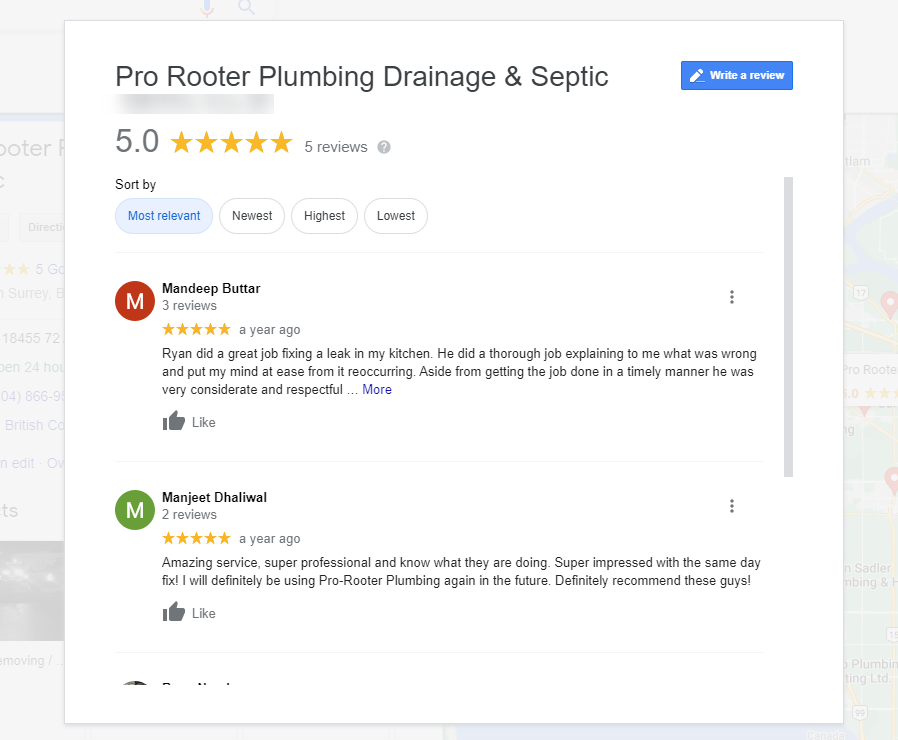
Just like we consumers check ratings, Google’s QRs are instructed to look at a company’s reviews on sites like Google, Yelp, and the Better Business Bureau when evaluating the E-E-A-T of a specific website. The best thing you can do is encourage positive reviews and respond to and remedy negative reviews to keep those trust signals flowing in.
6. Invest in Security
Security is a big deal for Google. In 2021, they even made changes to the Search Console to make it easier for websites to adopt HTTPS and find security issues within their website. In Google’s view, secure sites are more trustworthy.

To make your website secure, start by making sure your website has its SSL certificate. You should also look into security standards for your industry. Your goal with this step is to create the most trustworthy website possible — both Google and your website visitors will reward you for it.
7. Add Pages That Inspire Trust in Your Website
Although well-written content, a slick design, and an expert author do a lot to inspire trust in your website, there is a lot more you can still do to make your website more trustworthy. One way to do this is specific pages that demonstrate your commitment to privacy and quality.
For example, you should consider creating:
- A Privacy Policy Page: Privacy policies tell users how you plan to collect and use their data. Google wants to see the privacy policy on a website because it helps build trust that you aren’t doing anything nefarious with the data you’re collecting. If you accept credit card information for payments, use analytics tools (like Google Analytics), or use remarketing tools, you need a privacy policy.
- A Contact Page: In Google’s eyes, if your website isn’t allowing visitors to contact you, you’re probably hiding something. It’s all about transparency. Consider adding a phone number and email in the footer, a live chat plug-in, or a dedicated “Contact Us” page with everything someone would need to get in touch with you.
- Editorial Guidelines: If you write and publish content on your website, you should consider creating editorial guidelines. This step is specifically called out in Google’s Search Quality Evaluator Guidelines. Editorial guidelines will help improve your trustworthiness by proving that you have a well-defined process for creating and editing content that ensures only accurate and well-written content makes it to your pages.
Not every website will need each of these pages, so consider which will work best for your website and add them as you need to. If you’ve already made these, then make sure they’re easily visible. That way, it’ll be easier for Google and readers to see how trustworthy your site truly is.
E-E-A-T Is One Facet of Stronger SEO
As much as we can groan about yet another bar to clear with our sites, it is encouraging to see Google take quality so seriously. As users, we should run into fewer sites (in the search results) that look promising but fall flat. As site managers and SEOs, we know that our hard work is being elevated above a phoned-in approach.
However, for content makers looking to improve their SEO, Google's updated Search Quality Evaluator Guidelines act as something of an open book test. E-E-A-T is just one part of making sure you rank well on Google and other search engines. You can learn more about how to improve your page rankings and increase your organic traffic by taking a look at our SEO audit filled with 16 steps that will complement your quality factors and help you grow your website.

